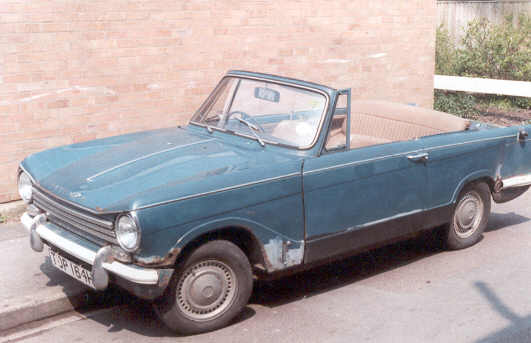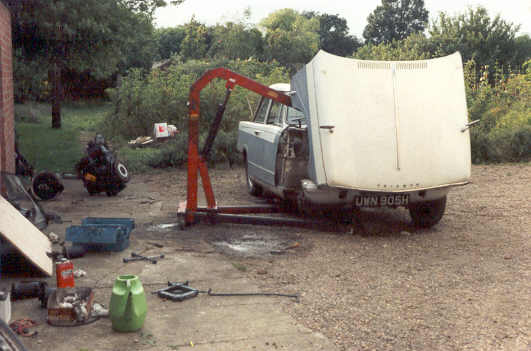![]()
Put simply, it is the science of running a car for next to nothing. The term 'Bangernomics' was the creation of motoring journalist and author James Ruppert, who in 1993 published a book of that title. The book is still available, and it's cracking good value. Click here to find out more.
If you have no money, Bangernomics can be the lifeline that helps you get a better job, avoid having to live next door to work or depend on unreliable and expensive public transport. Even if you aren't that poor, following the Bangernomics philosophy will leave you with more money for the fun things in life - foreign holidays, smart clothes, single malt whisky, or whatever. Or how about running a banger as daily transport, and using the money you save to buy an E-type Jaguar for the weekends, or a Harley-Davidson, or even a light aircraft? That's how much money you are throwing away by doing what the motor manufacturers want you to do - buying a new car on finance, having it serviced by a main dealer (to keep up the warranty), then trading it in after three years for another new car.

I bought this genuine factory V8 Land Rover (built in 1980) and ran it for a couple of years. It only did 12 mpg, but I could afford it because my other car was a banger. Click here to find out more about V8 Land Rovers. These days I have a lovely trackday Mk1 Golf GTi - again, funded by the saving I make on my daily motoring costs.
I first got into old bangers when I left school. As a present for passing my driving test, my dad bought me a Morris Minor. It was a derelict heap, painted bright green, with a massively worn engine and advanced rust just about everywhere. After two months it failed its MoT on so many points that the tester had to use a second failure sheet to write them all down, and I realised that as an impoverished student, the only way I would avoid travelling everywhere by bus was to get a lot smarter about the kind of vehicles I chose.
The ideal is to buy a vehicle needing no major work, run it until it is just about to need big money spending on it, then sell it (hopefully getting back most of what you paid) and buy something else. I pursued this policy with some success - in my three years at university I owned two Triumph Heralds, two Land Rovers, an Alfasud Ti and a Hillman Avenger, and the only one I lost money on was the Alfa (the floor fell out). The profit I made on the rest more than paid for repairs, tyres, tax and insurance, so the basic philosophy is sound. Mind you, some of the cars I drove looked pretty shabby, but who cares when you've got a car and none of your mates have? Even when the car looks like this.

Back in 1988, you could still get a car like this through the MoT - check out the big rust hole in the front wing. I bought this Herald 13/60 from a scrapyard for £70. welded in a few plates underneath, did 15,000 miles in it and sold it to a dealer for £350 at the height of the classic car boom of the late eighties. Six weeks later I saw it advertised 'fully restored' for £1,150. Someone was well and truly 'done'. I wonder if the car still exists?
Of course, if you are going to run a car on a really tiny budget, it helps if you can do all the repairs yourself, or at least the routine servicing stuff. I started helping my dad when I was about eight years old. He was an ardent follower of the Bangernomics philosophy many years before the term was invented, so we always seemed to have strange old cars (Ford Anglia, Bedford Beagle van, Triumph 2000 Mk 1) when all my schoolfriends' parents had nearly new Cortinas or Escorts. He taught me some basic repair techniques, and I set about repairing my bicycle, then a lawnmower (which never ran again after I had stripped and rebuilt the engine).
While I was still at school I bought a 1970 Fiat 500 for £15. It had stood in a garage for ten years, but I got it running and sold it on for £30. I was well pleased, until Fiat 500s became a London fashion accessory about two years later, and rusting basket cases like mine were suddenly worth upwards of a grand.... The Fiat was followed by a derelict Lancia Beta Coupe. I never managed to get that to run, but having been given it for free, I persuaded a scrappy to pay me a fiver for it. Then I left school, and acquired my first 'real' car - the Morris Minor referred to above.

The only real downside of running old cars - they can make a mess of the garden. Here's my first Herald getting an engine change. Shortly after the photo was taken, my mum came home from work. I was in deep trouble, especially when she saw her watering can full of degreasing fluid.
Over the last fifteen years I reckon I have owned around fifty old cars, and all but three have cost me less than £1,000 to buy. Sometimes much less - I only paid £40 for the Avenger, did 20,000 miles in it with no trouble, then got run into by another car, got £175 from the other driver's insurers and sold the Avenger (still running, but a bit dented) for £170. I loved that car.... If I were to add up all the money I have lost on every single vehicle I have owned, I reckon it would be less than what I would lose if I bought a new VW Golf, kept it for three years and traded it in for another one. And in all that time I have only had to call the AA out three times. So the philosophy works.
So what are the basic principles?
1. Inspect the car very carefully before you buy. Choose something that has solid bodywork and good mechanicals. Colour, specification and age don't come into it.
2. Look after the car properly. Don't skimp on basic maintenance - keep to the servicing schedule (you will be amazed how much you can do yourself, even if you don't have a lot of experience) and don't begrudge spending a bit of money to buy reliability. Old cars are not intrinsically unreliable - but neglected ones are.
3. However attached you are to the car, if it gets to the stage where it is about to need serious work (new clutch or similar) then as long as it is still drivable, cut your losses and get rid of it. Most car buyers don't know what they are looking at, and if you give the car a good polish and an attractive price, then someone will buy it even if the clutch slips and the head gasket is on the way out.
It's as simple as that. However, if you are new to the old car game, it can all seem a bit confusing, and there isn't a lot of helpful information around. That's where this site comes in.
How much can I save?
Say you buy a new VW Golf, price £14,000. You don't have fourteen grand in cash, so you pay £4K as a deposit (your old car, traded in) and the balance on finance over three years. After three years your car is worth £7,000 at best, and you have paid around £1,500 in finance charges. So that's £8,500 down the drain for starters.
Because the car is new, and on finance, you have to go for comprehensive insurance - maybe an extra £1,000 per year if you live in a city. You have to pay main dealer rates for servicing - £40 per hour or more. On the other hand you don't have to worry about repairs (covered by the warranty) and the tyres, exhaust and battery should last as long as you keep the car.
If you take the Bangernomics route instead, you might in that time own three cars at £500 each. Even if they all fall apart after a year, the most you have lost is £1,500. More likely it will be around £500, and if you find a real cracker of a car, you could get three years out of it and still sell it on for nearly as much as you paid. You'll have to fork out for tyres, exhaust and battery unless you are very lucky, but that shouldn't come to more than £300 over the three years. Older cars need more frequent servicing, but even if you can't do this yourself, you can use your friendly local garage (£15 per hour, and the parts are cheaper as well). Hence the servicing costs will be no more than for a new car, and possibly less. So you would have to spend around NINE GRAND on breakdown repairs over the three years to be worse off. That's three reconditioned engines a year......
What about the environment?
Old bangers don't always have catalytic converters, electronic engine management or any of that other environmental stuff (although an increasing number do), so if you are green-minded, it is fair to ask what effect your banger is having on the environment. The car manufacturers certainly want you to think you can 'do your bit' by scrapping your old car and buying a brand new one, and they are trying (so far without success) to persuade the Government to give cash incentives to people who do this.
But consider this. A car uses more energy and produces more pollution in its manufacture and disposal than in the whole of its working life. So by keeping an old car on the road, instead of scrapping it and buying a brand new one, you are doing the environment the biggest possible favour, short of giving up driving altogether.
And the real pollution problem isn't caused by old cars, but by badly maintained ones. A new car doesn't need an MoT until it is three years old. By then it could have done 90,000 miles with minimal servicing, and be spewing out more pollution than a Russian power station. And as for catalytic convertors - not only do they increase fuel consumption (and therefore greenhouse gases), but they are also very fragile. There are any number of ways to kill a 'cat' (driving through floods, putting LRP in the tank instead of unleaded, even push starting your car when the battery has gone flat) and a 'cat' equipped car with a faulty convertor will produce more pollution than an older car in good condition. So follow the Bangernomics philosophy, keep your old car well maintained (which also means it uses less fuel) and you can drive with a clean conscience.
But I don't want to drive horrible cars
You don't have to. I have owned two Golf GTIs, an Astra GTE, an Audi 80 Sport, Audi Coupe GT, a Mini pick-up truck, an Alfasud Ti, ex-Army Lightweight Land Rover, Triumph 2000 Mk2 (with overdrive) - modern classics all. Take a look at the under £1000 section in the Auto Trader - you're spoilt for choice. I reckon there is far more fun to be had at the bottom end of the market - you can find some seriously entertaining old cars (BMW 535i, Audi Coupe Quattro, Ford Sierra XR4x4, Lancia Delta Turbo) for silly money, and the stakes are much less than if you pay ten grand or more for a newer version of the same thing.
Of course your neighbours will think you're mad (unless they all drive bangers as well). But you get to spend a fortnight in an exclusive hotel on a Caribbean island, while they make do with 14 nights self catering in a dodgy Spanish resort. Who's really mad?